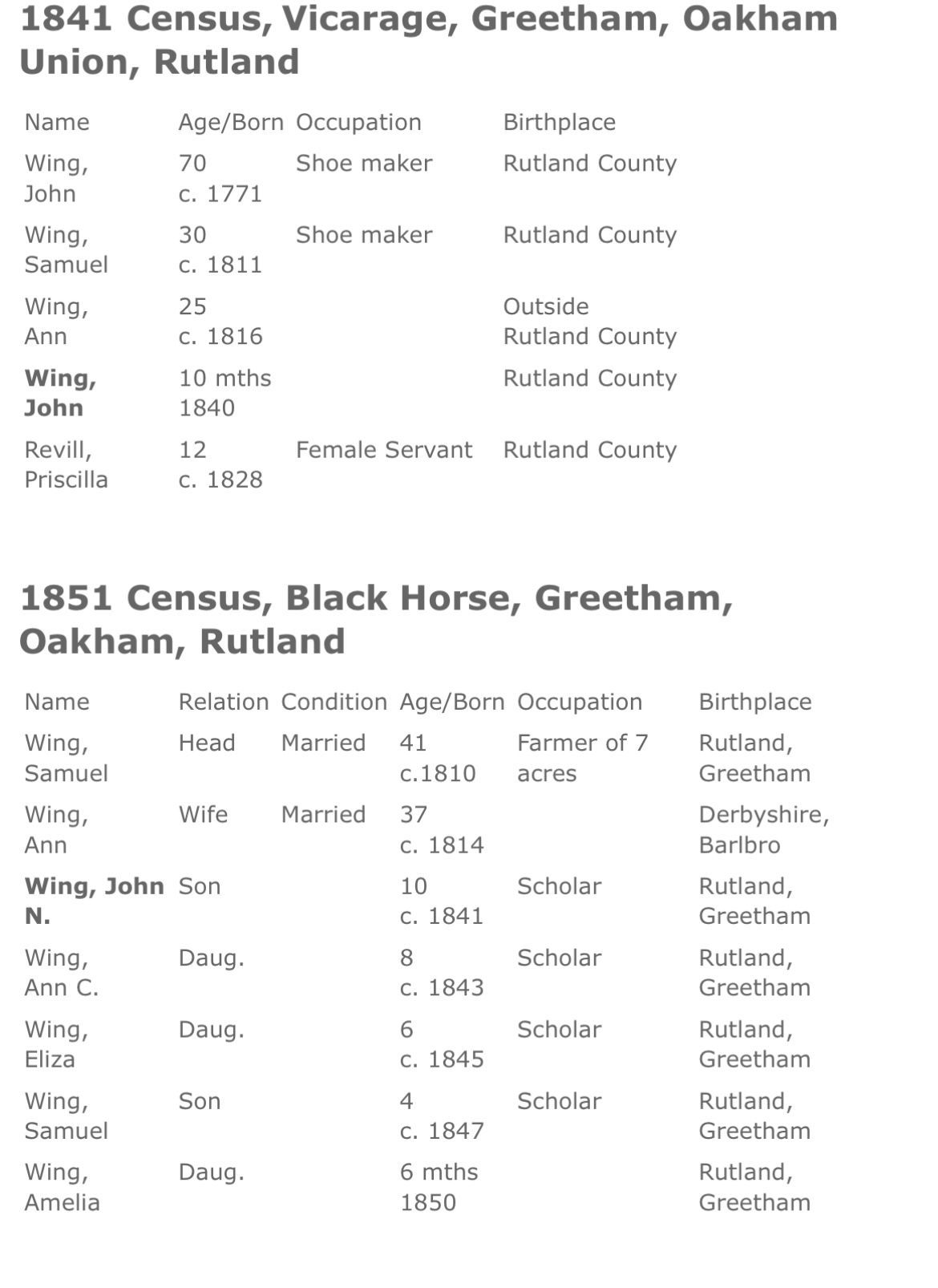John Unwin Wing
It is remarkable that a man who lived in two of the most prestigious homes in our area, Brinkburn Grange and Totley Hall; who was a churchwarden at Dore Christ Church; who was a well-known and well-respected businessman in Sheffield, Derbyshire and London; who was one of the founders of the Institute of Chartered Accountants and who wrote a classic text on double-entry book-keeping which is still on sale at Amazon today, has been completely ignored by local historians.
John Unwin Wing was born in Greetham, Rutland in the third quarter of 1840, the eldest child of Samuel and Ann Wing (nee Unwin). His father was born in Greetham in 1809. His mother was born in Barlborough, Derbyshire in 1812. John's parents were married at Sheffield Parish Church (later Sheffield Cathedral Church of St Peter and St Paul) on 2 October 1839.
By the time of the 1841 Census, the family were living with Samuel's father, John Wing, aged 70 at the Vicarage, Greetham. Samuel's occupation was recorded as a shoemaker, the same as his father. Four more children were to follow in the next few years: Ann Curtis in 1843, Eliza in 1845, Samuel junior in 1847 and Amelia in 1850. The four older children were shown as scholars and it seems likely that John would have been schooled from an early age.

Black Horse Inn, Greetham
By 1851, the Wing family were living at the Black Horse Inn, Greetham and Samuel's occupation had become a farmer of 7 acres. A fifth child, William, was born in Sheffield in 1854 so it is probable that the family had moved to Yorkshire in the early 1850s.
In June 1859 John Wing, aged 18, articled clerk to Mr. J. G. Schofield, sat the examinations of the Society of Arts at the Sheffield People's College, Orchard Street, and obtained the following certificates: 2nd book-keeping and 3rd Arithmetic.
In the 1861 Census, the Wing family were living at 12 Watery Street in the Upperthorpe district of Sheffield. Samuel's occupation had changed yet again to that of a coal merchant whilst John, aged 21, had already begun on his chosen career as an accountant. By 1862 John was advertising his services as a public accountant, auditor and collector of rents and debts, operating from offices at 18 Church Street. He appears to have been particularly busy in collecting debts and acting in bankruptcy cases.

Thursday 23rd October 1862, The Sheffield & Rotherham Independent, (page 1)
John Wing became well known in legal circles too and in the County Court case of Hadfield v Naylor was disparagingly referred to as a "quasi-lawyer" by the counsel for the defendant.
On 3 July 1862, at St. George's Parish Church, Doncaster, John Wing married Jemima Jane, the eldest daughter of the late Mr. Robert Wilson, a farmer and vetinary surgeon of Barmby, near Howden, East Riding.
In February 1865 John Wing was to earn a certain notoriety by suing the Manchester, Sheffield and Lincolnshire Railway Company for the sum of £1 for wasting his time. He had boarded a train at Barnsley at precisely the time the only train in the station was scheduled to depart for Sheffield, but in fact it was the service to Wakefield. John contended that the railway company's servants should take proper precautions to ensure that passengers boarded the correct train, but the judge found that the railway company had no such duty and he lost the case.
The couple were living at Carlton Villa, Upperthorpe when a daughter, Louisa Ann, was born on 27 September 1865. Proof of a longstanding family connection with Sheffield, perhaps, is that when John Unwin Wing was Company Secretary of the Sheffield Carriage Company, its manager was John Wing Unwin! The two men even lived in the same area of the city: John Unwin Wing in Upperthorpe and John Wing Unwin in Shalesmoor.
In December 1865 John Wing's book "Wing's Mercantile Book-keeping" was published. Remarkably, a facsimile copy of the original edition of the book is still sold today.

John Unwin Wing's text book on Mercantile Book-keeping is still being sold more than 150 years after it
was first published.
As a result of his growing reputation, John became more involved in work for corporates. The election of Auditors and Assessors for the Borough of Sheffield saw John Wing elected in several successive years. He became Auditor to the Fifth Borough Benefit Building Society, (Joseph Mountainwas one of its Directors), and when the Sheffield Waggon Company Limited was formed in 1867, John Wing became its Company Secretary, with offices at Prideaux Chambers, Change Alley. Over the next few years, John also became an Auditor to the Sheffield Music Hall Company Limited, to The Sheffield Turkish and Public Baths Company Limited and to The Sheffield Steel and Manufacturing Company Limited. Further lucrative work came from acting as Receiver or Trustee in Liquidation in cases of company failures.
Three more children were born to John and Jemima in quick succession: Ada Elizabeth in 1868, John Wilson in 1869 and Lillian May in 1870. In the 1871 Census, the Wing family were living at Hunter House, Ecclesall Road, and they employed four servants: a nurse, housemaid, cook and groom. They had moved there in March 1870 having sold their substantial stone-built villa in Montgomery Road, Sharrow for £805.
In 1871 an extraordinary charge was brought against John Wing for stealing a quantity of boots and shoes belonging to James Sheldon, a shoemaker of West Bar. Sheldon had been adjudged bankrupt, and as Trustee, John Wing had seized all his stock-in-trade and the charge was brought against him. The County Court judge ruled that it was not a matter for a criminal court and that the case had been brought in error and there the case ended.
At the half-yearly shareholders meeting of the Sheffield Waggon Company Limited, in February 1872, considerable satisfaction was expressed at the continued success of the company; a dividend at the rate of 9% p.a. was payable on Ordinary Shares and 6% p.a. on Preference Shares.
Brinkburn Grange was first offered to let in March 1873 but it appears to have remained unoccupied until John Wing and his family moved there in the following year.

Brinkburn Grange and Lodge, Abbeydale Road side
By 1875 a company styled Wing, Wing & Co. had been formed between brothers John Unwin and William Wing, and by 1877 London offices opened at 1 Princes Street, Bank. John Hunt Lilly, a chartered accountant of Havelock Street became a partner in 1880 and the firm renamed Wing, Wing, Lilly & Co.
On 24 March 1880 the draft of the charter for the incorporation of The Institute of Chartered Accountants of England and Wales was submitted to and approved by Queen Victoria. The charter provided for the creation of two classes of membership (fellows and associates), rules for admission, a code of conduct, membership fees etc. Fellows would be entitled to use the letters F.C.A. after their name, associates A.C.A. similarly. The petition to Her Majesty was on behalf of seven prominant accountants including John Wing, the President of The Society of Accountants in England.
In September 1881 the Wing Family moved to Totley Hall, striking a very favourable deal. The property was obtained on a sixteen year's lease at £150 per annum and included not only the old hall but 150 acres of land. John let out 143 acres and so had the hall and remainder of the land for just £10 a year. However, the hall was in a poor state of repair and John began to alter and build a billiard room and balconies with access from the bedrooms.

Totley Hall after the 1883 extension attributed to W.K. Marples but before the Milners built the East Wing in 1892-94
Then, without warning, on 12 May 1882, John Wing was arrested by Sergeant Thompson on two warrants issued by the Stipendary Magistrate and removed to the Town Hall. Shortly after he was brought up in the First Court before the Stipendary for a formal remand, which was granted. No application for bail being made, he was held in Wakefield prison. The partnership was formally dissolved the next day.
On 22 July 1882 at Leeds Assizes John Wing pleaded guilty to four indictments of illegally obtaining money from the Sheffield Waggon Company Limited, for whom he was company secretary. Two charges involved the forgery of a receipt for £7,000 and an altered cheque for £8,000. The other two charges related to the forgery of an agreement to lease 150 railways waggons, and, in a separate case, 160 railway waggons. In all, by forgery and fraud, he obtained the sum of £50,500 between June 1880 and April 1882. He was sentenced to seven years penal servitude and transferred to Pentonville prison in London. Further details of the court case, including John Wing's explanation for his behaviour, may be found in our Newspaper Archive.
In October 1882, petitions were filed against him in both the Sheffield and the London Bankruptcy Courts - he had claimed his residence to be in London but the judge held that "Her Majesty's Prison is no place of residence for nay of Her Majesty's subjects" - and he was adjudicated a bankrupt. His personal and business accounts with the Sheffield Union Banking Company were both overdrawn and to pay off the debit balances the bank sold the lease to Totley Hall that John had deposited as security.
It would appear that John Wing did not serve the full seven years imprisonment because he returned to Sheffield in January 1888 to assist with the liquidation of The Sheffield Waggon Company Limited which, perhaps unsurprisingly, had become insolvent. In March he applied to be discharged from his bankruptcy. This was eventually refused by the London Bankruptcy Court in June.
On 20 October 1888 Jemima, John's wife, died at Hanover Square, Sheffield at the age of 50.
John then set up home at Hockenden, St. Mary Cray, Kent. In August 1890 he married Miss Janet Ashwell Tabor, the fourth daughter of the late James Ashwell Tabor, J.P., of Colchester. In the Census of the following year, also living with the married couple, were John's three daughters, Louisa, Lillian and Ethel. Lillian had married and her children Osman and Marguerita were with her. The family employed three servants.
On 1 January 1893 John's youngest daughter Ethel died suddenly. She had been well since her return from Egypt two years earlier and had been skating the previous day with her brother and sister Edith. She had suffered no injury and had gone to bed as usual that evening but had died early the next morning, apparently from a blood clot on the heart. She was 17.
On 15 July 1900 John Unwin Wing died, aged 61. His widow was left the sum of £62 10s. Sheffield and North Derbyshire newspapers, which had been full of stories of his rise and fall in earlier times, didn't even carry a notice of his death. He was a forgotten man.





